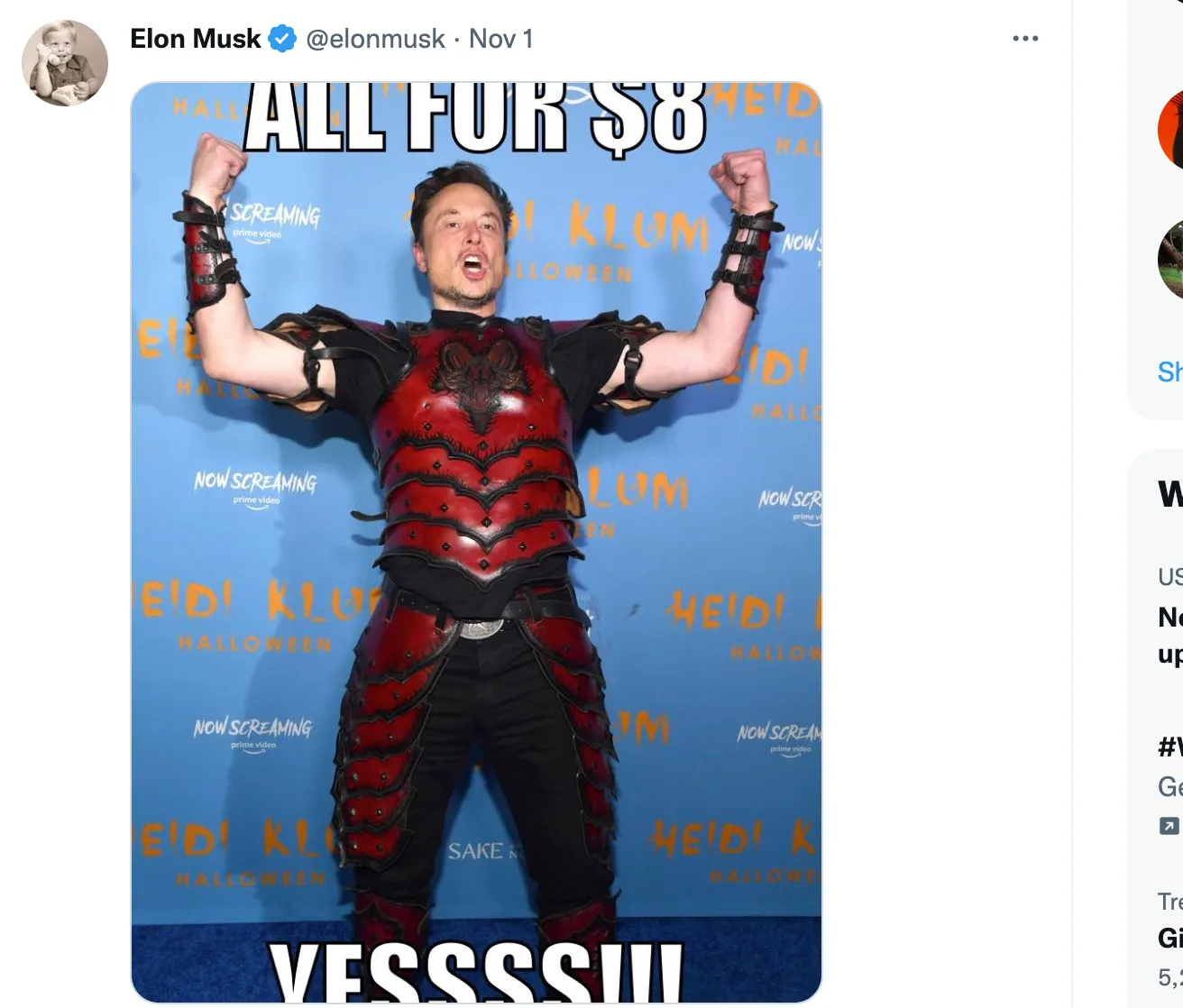
Elon Musk accomplished a lot this week.
No, I’m not talking about the Twitter owner’s implementation of the 8 dollars for a blue checkmark scheme, his massive reduction in workforce before rehiring many of them the next day, or his proposal for a content moderation council to judge and delete dangerous tweets. I’m more interested in how, by his own example, he revealed his own impotence as well as that of the social media star he replaced, Donald Trump. And in doing so, Musk has also revealed the inadequacy of any dictatorial approach to technology, business, or politics.
Let’s go through this fast, just like Musk did:
From the get-go, his decision-making process has been imperious, whimsical, lacking any coherent strategy or awareness of second and third-order effects, oblivious to the way choices externalize harm to others, and as performative as a businessman on reality TV. He played to the most sycophantic entourage of hangers on — all of them trying to win the attention of their cult leader. He came out of the gate — literally hours into his first morning as chief — spreading fake news and defying all social norms.
And no, I’m not talking about Trump, but his replacement at the top of the Twitter troll pole, Elon Musk.
I think the only way to understand Elon Musk is as the third in a succession of increasingly powerful social media anti-heroes who melted down in front of millions of people. The first was Charlie Sheen, who shortly after getting fired from his sitcom proceeded to go on a manic posting streak. “Tiger blood” and “Winning” may not have been potent memes, but Sheen had jumped into what we might call the “standing wave” of social media culture.
This all occurred immediately after the Iran’s “Twitter revolution,” when it seemed the entire platform had become super serious as we collectively witnessed a nation attempting to wrest itself from authoritarian control. We needed comic relief, and Sheen leaped into the twitterverse like a surfer into the ocean. He was carried along a wave of attention populated less by true fans than voyeurs hoping to watch the inevitable crash.
Donald Trump was the next to take the leap. He was not a leader with policies so much as a salesman capable of reading the emotional and entertainment needs of his audience. He rose to fame taking down critics like Rosie O’Donnel or posting unattractive pictures of other candidates’ wives. His power, such as it was, derived from his ability to tweet orders to the crowd. Turn on Trump, and he will turn his followers on you.
Many feared that the worst thing Musk might do on taking the helm at Twitter would be to restore the former president’s posting privileges. But instead of restoring Trump, Musk replaced him as Tweeter In Chief. Yes, Musk is to Trump as Trump is to Sheen. And just like his predecessors, Musk is less concerned with his impact than how it plays with the crowd. He just wants attention. And maybe to show that he can become the true techno-monarch called for in his partner Peter Thiel’s political philosophy.
But if the last few days were any indication, he has also revealed why he could never be trusted with such power. For just as Trump would threaten his adversaries with the wrath of his Twitter following, Musk is now doing the same to his advertisers.
Many brands paused their spending on the platform this week for fear of how the platform was changing. As Musk saw it, “Twitter has had a massive drop in revenue, due to activist groups pressuring advertisers, even though nothing has changed with content moderation and we did everything we could to appease the activists. Extremely messed up! They’re trying to destroy free speech in America.”
Musk’s response was to threaten them with “thermonuclear name & shame if this continues.” In other words, he is going to use Trump’s mob blackmail techniques in business instead of just politics: advertise on my platform or my army of trolls will mimetically annihilate you.
What an elucidating preview of how a techno-monarchy might work! (Not to mention what a winning inducement for new brands to join the platform and face similar offers-they -can’t-refuse.)
But the net effect of Musk’s activities this week was mostly bad for Trump, bad for tech titans, and good for democracy. Musk upstaged Trump just when the former president was looking for some attention (he says he’s running again!) and influence over the midterms. Musk certainly distracted media coverage from Trump’s escapades at a pivotal moment. Was it enough to sway the election? We will never know.
More importantly, by enacting Tiger Blood 3.0, Elon Musk has exposed not only the problem with running a social media network from the top, but also the dangers inherent in giving a social media star so much authority over our world.
Luckily, we are finally getting the message.
(Oh — and you can find me on Mastodon at @[email protected] )